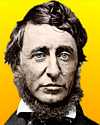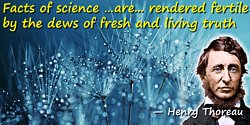 (source)
(source)
|
Henry Thoreau
(12 Jul 1817 - 6 May 1862)
American writer, naturalist, philosopher and poet who is best known for his study of nature, while retired to live in a hut beside Walden Pond at Concord (4 Jul 1845-6 Sep 1847). Thereafter, he wrote two books: A Week on the Concord and Merrimack Rivers (1849) and Walden, or Life in the Woods (1854).
|
Henry Thoreau Quotes on Fact (7 quotes)
>> Click for 92 Science Quotes by Henry Thoreau
>> Click for Henry Thoreau Quotes on | Law | Life | Nature | Science | Truth |
>> Click for 92 Science Quotes by Henry Thoreau
>> Click for Henry Thoreau Quotes on | Law | Life | Nature | Science | Truth |
Even the facts of science may dust the mind by their dryness, unless they are … rendered fertile by the dews of fresh and living truth. Knowledge does not come to us by details, but in flashes of light from heaven.
— Henry Thoreau
Essay, first published as 'Life Without Principle', Atlantic Monthly (Oct 1863). Collected in Yankee in Canada, Etc., (1866) 267. Also excerpted in H.G.O. Blake (ed.), Thoreau's Thoughts: Selections From the Writings of Henry David Thoreau (1890, 2005), 102.
He has something demoniacal in him, who can discern a law, or couple two facts.
— Henry Thoreau
In 'Natural History of Massachusetts', The Dial: A Magazine for Literature, Philosophy, and Religion (Jul 1842), 3, No. 1, 39-40. In 'Natural history of Massachusetts', The Dial: A Magazine for Literature, Philosophy, and Religion (Jul 1842), 3, No. 1, 39-40.
How indispensable to a correct study of Nature is a perception of her true meaning. The fact will one day flower out into a truth. The season will mature and fructify what the understanding had cultivated. Mere accumulators of facts—collectors of materials for the master-workmen—are like those plants growing in dark forests, which “put forth only leaves instead of blossoms.”
— Henry Thoreau
(16 Dec 1837). In Henry David Thoreau and Bradford Torrey (ed.), The Writings of Henry Thoreau: Journal: I: 1837-1846 (1906), 18.
I went to the woods because I wished to live deliberately, to front only the essential facts of life, and see if I could not learn what it had to teach, and not, when I came to die, discover that I had not lived.
— Henry Thoreau
Walden (1854), 143.
If we knew all the laws of Nature, we should need only one fact or the description of one actual phenomenon to infer all the particular results at that point. Now we know only a few laws, and our result is vitiated, not, of course, by any confusion or irregularity in Nature, but by our ignorance of essential elements in the calculation. Our notions of law and harmony are commonly confined to those instances which we detect, but the harmony which results from a far greater number of seemingly conflicting, but really concurring, laws which we have not detected, is still more wonderful. The particular laws are as our points of view, as to the traveler, a mountain outline varies with every step, and it has an infinite number of profiles, though absolutely but one form. Even when cleft or bored through, it is not comprehended in its entireness.
— Henry Thoreau
In Walden (1878), 311.
Observation is so wide awake, and facts are being so rapidly added to the sum of human experience, that it appears as if the theorizer would always be in arrears, and were doomed forever to arrive at imperfect conclusion; but the power to perceive a law is equally rare in all ages of the world, and depends but little on the number of facts observed.
— Henry Thoreau
In A Week on the Concord and Merrimack Rivers (1862), 383.
The fact which interests us most is the life of the naturalist. The purest science is still biographical.
— Henry Thoreau
In A Week on the Concord and Merrimack Rivers (1862), 382.
See also:
- 12 Jul - short biography, births, deaths and events on date of Thoreau's birth.
- Henry Thoreau - context of quote “Dews of fresh and living truth” - Medium image (500 x 250 px)
- Henry Thoreau - context of quote “Dews of fresh and living truth” - Large image (800 x 400 px)




 In science it often happens that scientists say, 'You know that's a really good argument; my position is mistaken,' and then they would actually change their minds and you never hear that old view from them again. They really do it. It doesn't happen as often as it should, because scientists are human and change is sometimes painful. But it happens every day. I cannot recall the last time something like that happened in politics or religion.
(1987) --
In science it often happens that scientists say, 'You know that's a really good argument; my position is mistaken,' and then they would actually change their minds and you never hear that old view from them again. They really do it. It doesn't happen as often as it should, because scientists are human and change is sometimes painful. But it happens every day. I cannot recall the last time something like that happened in politics or religion.
(1987) -- 


